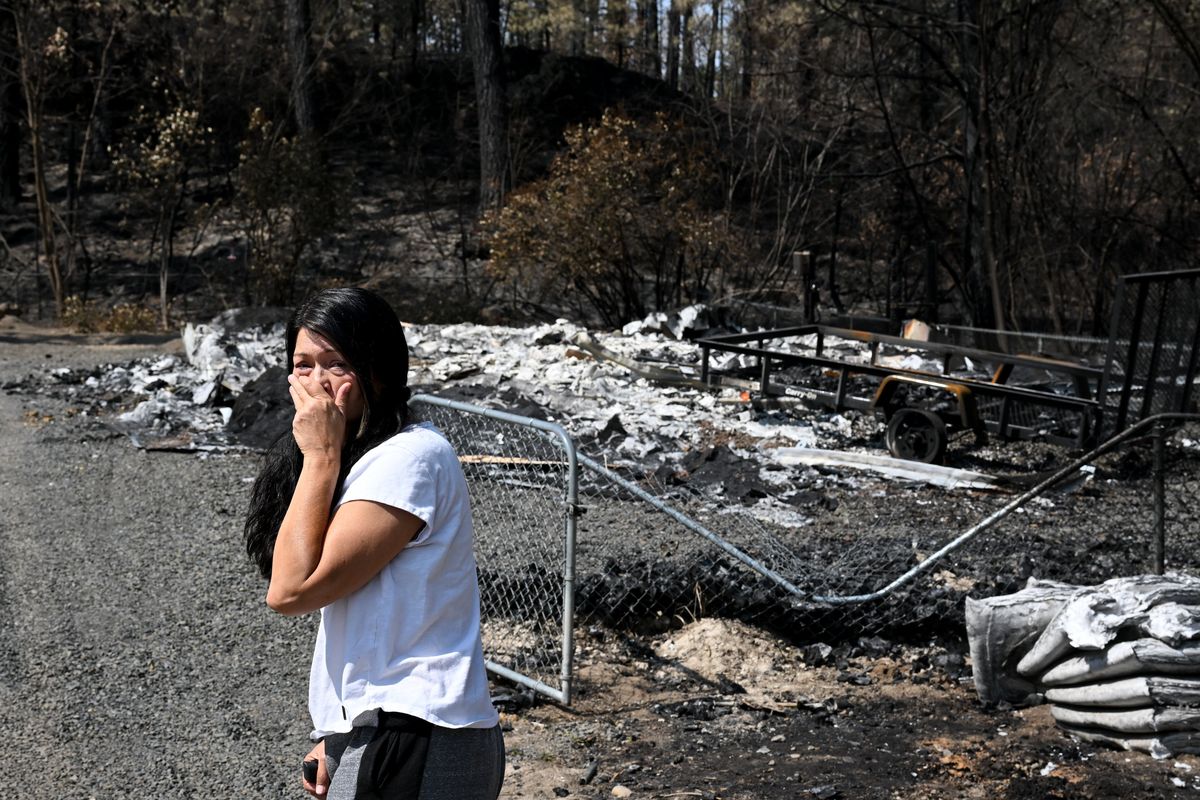‘It’s impossible’: 6 months after devastating fires, Medical Lake officials ask Washington government for more aid

OLYMPIA – In Spokane County, piles of ashy rubble sit beneath blankets of snow, sending toxic chemicals seeping into nearby bodies of water, aquifers and wells.
The Gray and Oregon Road fires leveled hundreds of structures, downed trees and destroyed entire neighborhoods last August. Many who resided in the small town of Medical Lake are still displaced, and local politicians are asking the state Legislature for support to clean up and rebuild after one of the most devastating natural disasters in Washington’s history.
“We’re too little, and the problem is too big,” Medical Lake Mayor Terri Cooper said last week at a legislative hearing in the state’s capitol. “We need the state of Washington to help us.”
On Thursday, the committee that Cooper spoke to unanimously advanced a proposed law that would require the Washington Military Department to create and oversee a program for long-term community recovery from disasters.
The program would legally obligate the military to create a recovery manual, issue grants to create long-term recovery groups, help communities plan their recoveries, provide training and create an address book full of resources. Cooper came up with the idea for the new law and passed it along to local State Rep. Mike Volz, R-Spokane, who sponsored the proposed bill.
After the fires demolished the small town Cooper calls home, she said the first thing she noticed was the sheer amount of debris everywhere and the amount of testing for toxic chemicals it all required. That process isn’t cheap, she said. It costs a (former) homeowner between $60,000 and $80,000 to asbestos-test the pile of rubble that lies where their home once stood.
“There was no funding for any of it,” Cooper said. “… I realized that wildfires are not treated the same way that tornadoes, hurricanes and those other things are.”
In Medical Lake, nearly 50 former homeowners do not have an insurance plan that will cover the testing of the pile of ash where they once slept.
Spokane County officials hope the state will pay to fund those tests.
Medical Lake is situated between two lakes – its namesake, Medical Lake, and Silver Lake. Removing all the debris and cleaning up the charred land alone is an estimated $8 million undertaking, the mayor said.
“You have this mass debris field, and then it’s the duty of each individual person to clean up their little square, if you will,” Cooper said. “It’s impossible. And then if the public does not take on the financial burden and the responsibility to clean that up, people don’t clean it up and then it’s sitting there. If they walk away from their property, it can sit there for three years.”
Medical Lake is asking the state for roughly $30 million extra to rebuild the water and sewage lines in three neighborhoods that burned down right outside of city limits.
The city is also requesting $30 million from state coffers to build 55 cabins on the west shore of Medical Lake to be on reserve for families displaced in emergencies.
“I’m concerned that if we don’t act now, we’ll lose our opportunity,” Cooper said. Volz also testified last week before the House Committee on Innovation, Community & Economic Development, & Veterans.
“Every community is different,” Volz said. “Every disaster is different, and you don’t know what you don’t know until something happens. That’s the intent of this bill.”
On Thursday, when news of the committee’s unanimous support broke, Volz sent out a written memo via email.
“This is a real solution that will impact many areas in my district when a disaster hits,” Volz wrote. “Simply put, it will help our communities be better prepared for recovery following a disaster. Any advance work we can do before a disaster strikes, will assist our residents get back on their feet quicker. And that must be our top priority.”
Spokane County Commissioner Josh Kerns joined Cooper and other local officials to travel to Olympia this month and lobby for help rebuilding Medical Lake.
To date, Spokane County has received $1,250,000 worth of aid from the Governor’s Emergency Account, $3,750,000 from the state Department of Commerce, $175,000 from the Spokane Regional Health District and $40,000 from the Spokane Regional Clear Air Agency. But the county needs millions more dollars in aid to continue its painstaking rebuilding process, officials say.
“We have individuals that are in tents. We have individuals who are in trailers,” Kerns said in a phone interview. “We’re here making sure legislators on the west side remember what happened to us.”
The long-term disaster recovery bill awaits a vote on the state House floor. If it passes there, it will move onto a state Senate committee.